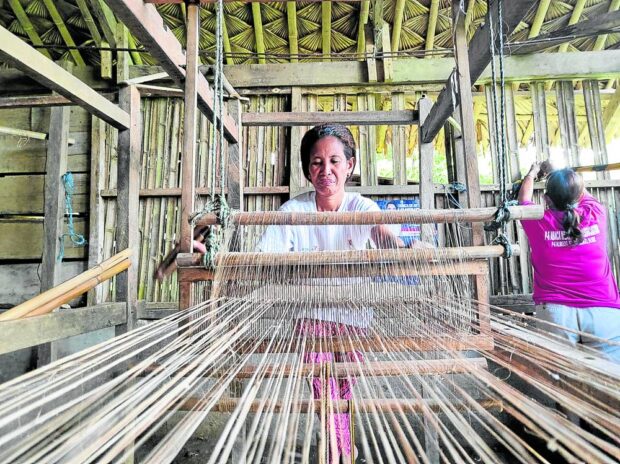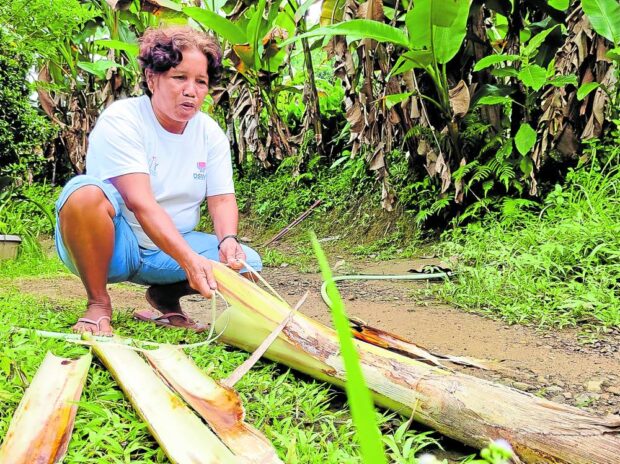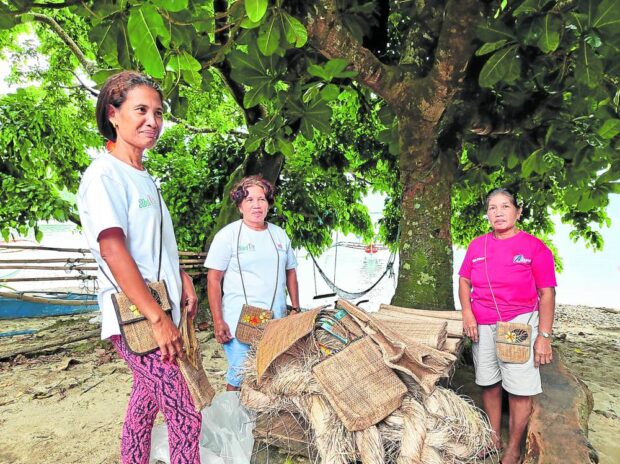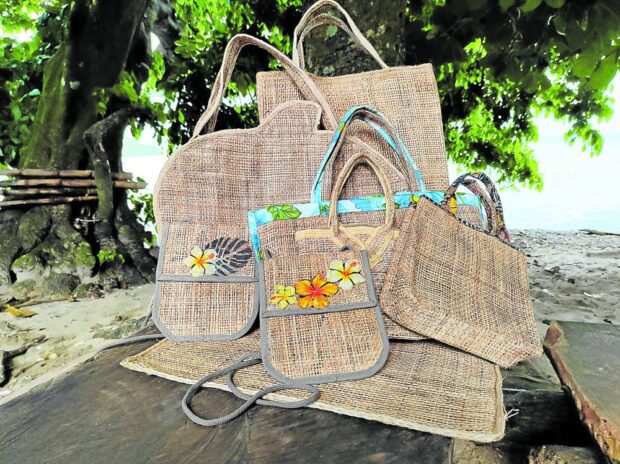In Albay, women find lifeline in abaca weaving

COMMUNITY LIVELIHOOD | Without the aid of modern machines, residents in a coastal village in Sto. Domingo, Albay, weave abaca fibers to make fashion bags. (Photo by JOHN MICHAEL MANJARES / Contributor)
STO. DOMINGO, Albay, Philippines — For a group of 14 women weavers at a remote village in this town, necessity is the mother of innovation as they level up their small abaca business to include something that can draw in more buyers —fashion bags.
From producing only plain 19-by-10-yard abaca (manila hemp) burlap, the women expanded their production to include fashion bags of different styles, which they then sold at P100 to P150 each to sustain their families.
“Through these fashion bags, we want to earn more and improve our business. We will also train in packaging to enhance our skills,” says Lolita Basanta, 50, who chairs the P-6 Abaca Weaving Sustainable Livelihood Program (SLP) Association.
The women weavers have already produced more than 100 bags of different styles, including sling, shoulder, tote and even market bags.
Established in January 2020 through a P220,000 grant from the Department of Social Welfare and Development, the association is composed of 14 housewives in Sitio Balite of Barangay Alimsog, a coastal community, which, despite being part of the mainland of Sto. Domingo, is more easily accessible via a 30-minute boat ride from the town center. A dirt road that turns muddy during rainy days can also be used going to the town but it takes 20 to 30 minutes to travel via “habal-habal” or rented motorcyle.
The women spent about P90,000 to build their wooden weaving tools and small workplace made of bamboo and light materials at a lot owned by Basanta.
They do not own a sewing machine to make the bags, so, after cutting the raw materials into their desired sizes, they would visit Basanta’s friend in a nearby village in Bacacay town to borrow one.

TEDIOUS JOB | Carmen Brizuela, 54, removes layers of leaf sheaths from abaca stalk to make fine fiber used in weaving burlaps and fashion bags. They grow more than 1,000 abaca trees from a hectare of land in a coastal village in Sto. Domingo, Albay. (Photo by JOHN MICHAEL MANJARES / Contributor)
Sustenance
Brizuela and her family members grow more than 1,000 abaca trees as tenants in a hectare of land in Alimsog. They source their abaca fibers from these trees. When there is not enough money for her family’s needs, Carmen Brizuela, 54, would borrow money from the association.
Brizuela says they pay their debt not in cash, but by working and weaving abaca burlap for the group.
“This really helped us a lot because we can get advanced payment that we can use for our children’s school allowance. I really need to borrow money because my husband’s earnings are irregular from catching fish,” Brizuela says.
From her own “lupis,” the raw abaca fiber, she can weave about 10 burlaps each week, sold at P195 apiece.
She does not have to pay for the transport cost of her products because all of them are sold to their SLP, which also buys lupis from other suppliers from their community.
If members do not have their own lupis, they can use the supply of the association to weave burlap.
The capital cost of the materials is deducted from the selling price of their total production.
With every burlap, Basanta says around P75 will be returned to the association as payment for the cost of the raw materials.
“They don’t need to borrow from lending companies to have their own capital, the association provides it for them,” Basanta adds.
About 200 burlaps were being transported by boat each month and sold at P210 to the main market at the town center.
The 35 percent of the earnings will be deposited into their bank account while the remaining money will be saved for the annual distribution of dividends.

The enterprise serves as an alternative livelihood for women in the community. (Photo by JOHN MICHAEL MANJARES / Contributor)
Family trade
Most of the families in the village rely on abaca production as their main livelihood.
When she was 14, Basanta started to help her parents in weaving abaca burlap. When she already started her own family, abaca weaving helped send her four children and relatives to school.
She says they cannot fully rely on the meager income of her fisherman husband as this livelihood’s success will always depend on weather conditions.
In 2008, Basanta was already managing her small abaca buy-and-sell business. She would buy abaca burlap produced by her neighbors for P135 and sell it for P150 at the town market.
Her business used to earn P2,000 each week but when most of her children were enrolled in college in 2010, her business went bankrupt. But she slowly recovered by borrowing capital from lending companies.
When she joined and headed the association in 2020, she took charge of delivering all the burlaps they produced to their main buyer at the market.

(Photo by JOHN MICHAEL MANJARES / Contributor)
Empowered
When Raquel Base, 30, lost her job in 2020, she had to find another way to generate more income to help her husband.
It became urgent for her to find another livelihood after she was retrenched as a room attendant at a hotel in Bacacay town, also in Albay, when the COVID-19 pandemic hit.
Base feels empowered now that she is earning for their family by weaving as a member of the association, while taking care of her two children.
“I am proud of myself because as a woman, I can somehow provide for my family and get regular income through weaving just within our community,” Base says.
Elenor Ballon, 62, another village resident, is not a member of the association but regularly sells 10 burlaps to the group every week.
“We, women, became the prime movers in the family. My husband’s income from fishing is just seasonal. So, if we don’t have a budget, I really need to find ways to [fill in] our needs,” says Ballon, who is also working as a barangay health worker.
She has her own weaving tool at home and sometimes hires others to help her in producing lupis.
Councilor Lyra Gregorio says the local government has coordinated with the Department of Trade and Industry to train local women in developing their skills in weaving, packaging, and trading their products.
On Friday, Gregorio and Mayor Joseling Aguas Jr. delivered a sewing machine to the members of the association.
“They could produce more fashion bags now because they have their own sewing machine. We will help them in marketing the bags,” Gregorio says in a phone interview on Saturday.
Women should not just rely on the income of their partners, especially in the area where most of them focus only on farming and fishing. They should help each other in exploring other means of livelihood,” says Gregorio, chair of the town council’s committee on livelihood, tourism, and health.